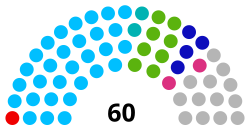Meghalaya Legislative Assembly
Meghalaya Legislative Assembly | |
|---|---|
 | |
| Type | |
| Type | |
| Leadership | |
Speaker | |
Deputy Speaker | |
| Structure | |
| Seats | 60 |
 | |
Political groups | |
| Website | |
| http://megassembly.gov.in/ | |
The Meghalaya Legislative Assembly is a unicameral legislature in the government of the state of Meghalaya in India.[1] Constituted as a directly elected body in 1972, it comprises 60 members, filled through direct elections held every five years.[1] Like other Indian states, Meghalaya has a parliamentary system of government. The executive branch of the Meghalaya government is derived from the Legislative Assembly.
History
In independent India, the areas now constituting the state of Meghalaya were part of the state of Assam and represented in the Assam Legislative Assembly. The Indian Parliament passed the Assam Reorganisation (Meghalaya) Act in 1969, which led to the establishment of an autonomous state of Meghalaya within Assam on April 2, 1970.[1][2] A legislature of 37 members for the new autonomous state was established, with representatives elected indirectly by the autonomous direct councils.[1][2] The first sitting of the assembly took place in Tura on April 14, 1970. In 1971, the Indian Parliament passed the North-Eastern Areas (Reorganisation) Act, which converted Meghalaya from an autonomous state within Assam to a full member state of the Indian Union.[1] The State of Meghalaya was officially formed on January 21, 1972.[1] The Legislative Assembly was then reconstituted as a directly elected body.
The regions of Meghalaya are represented in the Assembly, with 29 members elected from Khasi Hills, 7 from Jaintia Hills and 24 from Garo Hills.[3]
The eighth elections for the Legislative Assembly were held on 3 March 2008.[4] They resulted in the election of 25 representatives from the Indian National Congress, 14 from the Nationalist Congress Party, 11 from the United Democratic Party and 9 from amongst the other parties and independents. The election for one constituency - Baghmara - was postponed.
The ninth and most recent elections for the Legislative Assembly were held on 14 February 2013.[5] They resulted in the election of 29 representatives from the Indian National Congress, 13 independents, 8 from the United Democratic Party and 10 from 5 other parties.
Office-bearers
The office-bearers of the 8th Meghalaya Legislative Assembly are:[6]
- Shri A.T. Mondal- Speaker
- Sanbor Shullai - Deputy Speaker
- Dr. Mukul Sangma, Chief Minister of Meghalaya - Leader of the House
- Donkupar Roy - Leader of the Opposition
- Prestone Tynsong - Minister of Parliamentary Affairs
Committees
There are 15 committees in the Legislative Assembly of Meghalaya:[7]
- Business Advisory Committee: decides the time-table for assembly functions and for evaluation of legislation.[7]
- Committee on Petitions: responsible for examining petitions submitted to the assembly, collecting evidence and preparing reports.[7]
- Committee on Public Accounts: examines the budget, appropriations and auditing of state agencies, programmes and government.[7]
- Committee on Public Undertakings: responsible for monitoring and improving the workings of public sector undertakings such as government corporations, housing programmes and economic development schemes.[7]
- Committee on Estimates: evaluates statistics and estimates to improve the efficiency and administration of various government functions, agencies and programmes.[7]
- Committee Welfare of the Scheduled Tribes & Scheduled Castes: responsible for monitoring programmes aimed for the economic and social development of the scheduled castes, tribes and backward classes residing in the state of Meghalaya.[7]
- Committee of Privileges: examines any issues and violations of the privileges, conduct and benefits given to members of the assembly.[7]
- Committee on Subordinate Legislation: monitors if the state government's functions and legislation comply with the state constitution.[7]
- Committee on Government Assurances: monitors the reliability and fulfillment of targets and promises made by the chief minister and cabinet ministers.[7]
- Rules Committee: maintains the rules of business and code of conduct for members of the assembly.[7]
- House Committee: oversees the amenities for members of the assembly such as housing, food, health-care and transport.[7]
- Library Committee: is responsible for the maintenance and development of the state government and assembly library.[7]
- Select Committee: is charged with the examination and development of specific legislation, preparing it for final passage.[7]
- Committee on the Empowerment of Women: oversees schemes and programmes aimed to increase representation of women in society and economic sectors.[7]
- Budget Committee: examines budget proposals for various organs and departments of the state government.[7]
References
- ^ a b c d e f "Meghalaya Legislative Assembly". National Informatics Centre.
- ^ a b Hamlet Bareh (2001). Encyclopaedia of North-East India: Meghalaya. Mittal Publications. pp. 9–12. ISBN 978-81-7099-791-7.
- ^ "Homepage: Office of the Chief Electoral Officer, Government of Meghalaya". Chief Electoral Officer, Government of Meghalaya.
- ^ "Meghalaya Legislative Assembly Election 2008" (PDF). Chief Electoral Officer, Government of Meghalaya. 2008.
- ^ "Meghalaya Legislative Assembly Election 2013" (PDF). Election Commission of India, Government of India. 2013.
- ^ "Meghalaya Legislative Assembly Office-Bearers". National Informatics Centre.
- ^ a b c d e f g h i j k l m n o p "Meghalaya Legislative Assembly Committees". National Informatics Centre.
